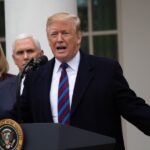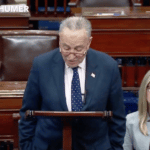



Republicans and Democrats in the Senate are in a heated disagreement over the confirmation process for President-elect Trump's energy nominees, sparking allegations of obstruction and protocol breaches.
Fox News reported that Senator Mike Lee (R-UT) claims that Democrats are hindering the confirmation process for energy department nominees, accusing them of delay tactics related to procedural issues.
Sen. Mike Lee, who chairs the Committee on Energy and Natural Resources, has called out Democrats for what he describes as stall tactics as they scrutinize President-elect Donald Trump's candidates for two critical energy roles.
As the nomination proceedings for Chris Wright for Secretary of Energy and Doug Burgum for Secretary of the Interior unfold, partisan tensions increase.
Lee accuses Senate Democrats of deliberately blocking the confirmation procedure, suggesting that this is part of a larger effort to obstruct the incoming administration.
Democrats, however, argue that Lee is sidestepping established Senate protocols by pushing forward with the hearings prematurely. Martin Heinrich, the leading Democrat on the committee, argues that essential documents have not been made available ahead of the scheduled hearings.
According to Heinrich, the absence of these documents, including FBI background checks and financial disclosure reports, represents a significant breach of "long-standing Senate protocols." These materials help ensure transparency and due diligence in the vetting process, he insists.
Democratic leaders, led by Heinrich, voiced their disapproval over the planned schedule, arguing that hearings were slated without their consent and prior to obtaining necessary documentation.
Heinrich emphasizes the historical consistency in adhering to both protocol and committee rules, noting an expectation for these materials to be provided well before any formal hearings.
The hearings for nominees were assigned dates—January 14 for Doug Burgum and January 15 for Chris Wright—which Heinrich contends were set despite the absence of complete documentation. Heinrich argues this departs from traditional practices held over decades by both parties.
Drawing a comparison to the Obama administration in 2009, Lee argues that, under similar circumstances, nominees for federal roles had hearings announced before all requisite documents were publicly available, though they were obtained shortly after announcements were made.
Despite these assurances, Heinrich remains unconvinced, asserting, "These are not just mere paperwork," in reference to the missing documents and emphasized the legal necessity for these disclosures.
Lee has insisted that Republicans remain committed to adhering to all committee rules despite the ongoing tensions, reiterating that his approach is legitimate within the broader procedural context. He refutes any notion of procedural misconduct, underscoring fidelity to rules regardless of ongoing pressure from the opposing party.
Meanwhile, Heinrich persists in his criticism of Lee's approach, expressing frustration over the hurried agenda.
He openly criticizes the chairman's decisions, believing that rushing the process without complete information undermines the intent of thorough vetting.
The lack of minority involvement in scheduling, coupled with the missing documentation, remains central to the Democratic argument for obstruction. Heinrich's vocal objections underscore a concern for both transparency and adherence to a process that ensures bipartisan evaluation.
Lee remains firm in his position, blaming Democrats for intentionally merging notice and nomination requirements in a manner he finds misleading. He argues that this interpretation serves only to slow the process rather than hasten a fair evaluation of the nominees.



